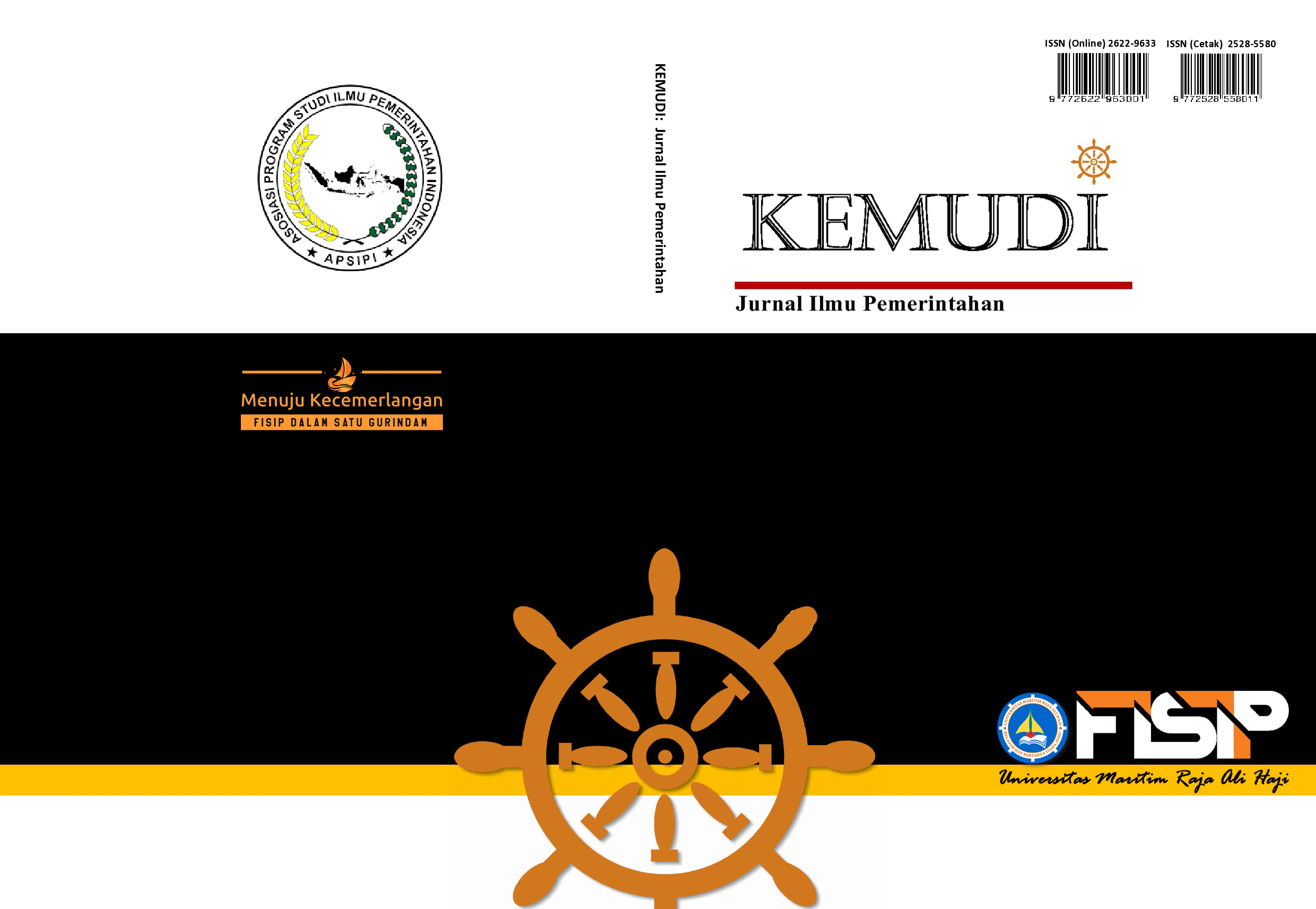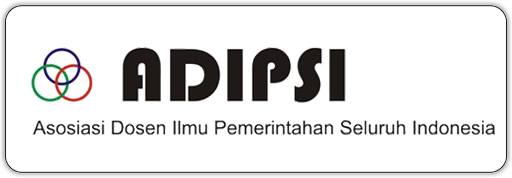From Global Norms to Local Practices: the Internalization of Children's Rights in Makassar through UNICEF Assistance
DOI:
https://doi.org/10.31629/kemudi.v10i1.7592Keywords:
Foreign aid; Children's rights; Norm localization; Makassar Children's Forum; UNICEFAbstract
Abstract: This study aims to understand how UNICEF, as a foreign aid actor, plays a role in internalizing children's rights norms into local policies and practices in Makassar City. The issue examined stems from the gap between global commitments through the Convention on the Rights of the Child (CRC) and the reality of child protection at the local level. A qualitative approach with a case study strategy was used, as it is appropriate for exploring complex experiences, perspectives, and social processes. Data was collected through in-depth interviews with members of the Makassar Children's Forum (FAM) and officials from the Makassar City Women's Empowerment and Child Protection Agency (DP3A); supplemented by participatory observation and analysis of official documents such as mayoral regulations, UNICEF reports, and training modules. The thematic analysis results show that the internalization of children's rights norms occurs through three main channels: technical assistance, policy advocacy, and community capacity building. This process follows the Norm Life Cycle pattern while undergoing adaptation through norm localization mechanisms. FAM acts as a norm translator that connects global values with local culture, such as siri and gotong royong. This study contributes theoretically by expanding the discourse on foreign aid as an instrument for norm diffusion, and practically by emphasizing the importance of local ownership in the sustainability of child protection. The findings suggest the need for stronger cultural translation strategies in child protection policies and programs at the regional level.
Downloads
References
Abdullah, Nurjannah, and Muhammad Fajhriyadi Hastira. 2023. “Perbandingan Implementasi The Convention on The Elimination of All Forms of Discrimination Against Women (CEDAW) Dalam Pemenuhan Hak Politik Dan Ekonomi Perempuan Di Arab Saudi Dan India.” Hasanuddin Journal of International Affairs 3(1):68–87.
Acharya, A. 2021. Constructing Global Order: Agency and Change in World Politics. Cambridge University Press.
Acharya, Amitav. 2004. “How Ideas Spread: Whose Norms Matter? Norm Localization and Institutional Change in Asian Regionalism.” International Organization 58(02):239–75. doi: 10.1017/S0020818304582024.
Acharya, Amitav. 2011. Whose Ideas Matter? Agency and Power in Asian Regionalism. Cornell University Press.
Alampay, E. A. 2022. “Child Rights and Governance in the Philippines: Between Policy Adoption and Local Political Realities.” Asian Journal of Comparative Politics 7(4):576–92. doi: 10.1177/20578911221083259.
Balán, Pablo, Juan Dodyk, and Ignacio Puente. 2022. “The Political Behavior of Family Firms: Evidence from Brazil.” World Development 151:105747. doi: 10.1016/j.worlddev.2021.105747.
BPS, and UNICEF. 2022. Kemajuan Perlindungan Anak Di Indonesia: Data Dan Analisis. Badan Pusat Statistik dan UNICEF Indonesia.
Braun, Virginia, and Victoria Clarke. 2021. “To Saturate or Not to Saturate? Questioning Data Saturation as a Useful Concept for Thematic Analysis and Sample-Size Rationales.” Qualitative Research in Sport, Exercise and Health 13(2):201–16. doi: 10.1080/2159676X.2019.1704846.
Creswell, John W., and C. N. Poth. 2018. Qualitative Inquiry and Research Design: Choosing among Five Approaches (4th Ed.). Sage.
Davies, S. 2022. “Localizing International Norms: Child Protection and Human Rights in Southeast Asia.” Journal of Human Rights 21(3):365–82. doi: 10.1080/14754835.2022.2034512.
Finnemore, Martha, and Kathryn Sikkink. 1998. “International Norm Dynamics and Political Change.” International Organization 52(4):887–917. doi: 10.1162/002081898550789.
Forum Anak Makassar. 2023. Laporan Implementasi Regulasi Kota Layak Anak. DP3A Makassar.
Forum Anak Makassar. 2024. Laporan Kinerja Forum Anak Makassar.
Hale, Thomas. 2020. “Transnational Actors and Transnational Governance in Global Environmental Politics.” Annual Review of Political Science 23(1):203–20. doi: 10.1146/annurev-polisci-050718-032644.
Hariyadi, Riska Putri. 2021. “FLEGT License in Indonesia-European Union Cooperation: Norm Life Cycle Analysis.” Jurnal Global & Strategis 15(2):218. doi: 10.20473/jgs.15.2.2021.218-236.
Hastira, M. F., and A. Maksum. 2024. “The Child-Friendly Cities Initiative Program: Indonesia–UNICEF Cooperation in Promoting the Fulfillment of Children’s Participation Rights in the Development Process in Surabaya City.” Journal of Political Research 19(2):145–62.
Katsumata S. S., H. .. Tan. 2021. “Norm Diffusion and Localization in Asia: Human Rights and Governance.” The Pacific Review 34(6):865–84. doi: 10.1080/09512748.2020.1826431.
Lancaster, C. 2007. Foreign Aid: Diplomacy, Development, Domestic Politics. University of Chicago Press.
Maji, Poushali, Zia Mehrabi, and Milind Kandlikar. 2021. “Incomplete Transitions to Clean Household Energy Reinforce Gender Inequality by Lowering Women’s Respiratory Health and Household Labour Productivity.” World Development 139:105309. doi: 10.1016/j.worlddev.2020.105309.
Moyo, D. 2009. Dead Aid: Why Aid Is Not Working and How There Is a Better Way for Africa. Farrar, Straus and Giroux.
Nowell, Lorelli S., Jill M. Norris, Deborah E. White, and Nancy J. Moules. 2017. “Thematic Analysis.” International Journal of Qualitative Methods 16(1):1–13. doi: 10.1177/1609406917733847.
Prather, Lauren. 2020. “Transnational Ties and Support for Foreign Aid.” International Studies Quarterly 64(1):133–47. doi: 10.1093/isq/sqz096.
Pratiwi, Putri Amalia. 2024. “Kerjasama Pemerintah Provinsi Sulawesi Selatan Dan United Nations Children’s Fund (UNICEF) Dalam Rencana Aksi Percepatan Pengurangan Jumlah Anak Tidak Sekolah Di Sulawesi Selatan.” JILS (Journal of International and Local Studies) 8(2):118–32. doi: 10.56326/jils.v8i2.4501.
Presiden Republik Indonesia. 1990. Keputusan Presiden Republik Indonesia Nomor 36 Tahun 1990 Tentang Pengesahan Convention on the Rights of the Child (Konvensi Tentang Hak- Hak Anak).
Quennerstedt, A. 2022. “Children’s Participation: A Critical Analysis of Lundy’s Model.” International Journal of Children’s Rights 30(1):54–78. doi: 10.1163/15718182-30010004.
Quennerstedt, A., C. Robinson, and J. I’Anson. 2021. “The UNCRC, Global Childhoods and Local Practices: Normative Dialogues and Critical Perspectives.” Childhood 28(1):3–18. doi: 10.1177/0907568220954852.
Setiawan, A. 2023. “Local Adaptation of Child Rights Norms in Indonesia: Lessons from Community-Based Protection Initiatives.” Indonesian Journal of Social Policy 5(1):45–62. doi: 10.22146/ijsp.2023.45211.
Stubbs, R. 2021. “Norm Contestation and Localization in Southeast Asia: The Politics of Rights.” Contemporary Politics 27(4):493–509. doi: 10.1080/13569775.2021.1898531.
UNICEF. 2021a. Annual Report: Child Protection in Indonesia. UNICEF Indonesia.
UNICEF. 2021b. Child-Friendly Cities and Communities: Handbook for Local Governments. UNICEF.
UNICEF. 2023. The State of the World’s Children 2023: For Every Child, Inclusion. UNICEF.
UNICEF, and Bappenas. 2021. Laporan Evaluasi Program Perlindungan Anak Di Indonesia. Kementerian PPN/BAPPENAS.
van der Veen, A. M. 2021. “Foreign Aid, Norm Diffusion, and Local Agency.” Third World Quarterly 42(6):1178–95. doi: 10.1080/01436597.2021.1883512.
Wiener, A. 2021. Contestation and Constitution of Norms in Global International Relations. Cambridge University Press.
Wolff, J. 2021. “The Local Lives of Global Norms: Rights, Resistance, and Accommodation.” Third World Quarterly 42(9):1987–2005. doi: 10.1080/01436597.2021.1928463.
Yilmaz, S. 2022. “Localizing Human Rights Norms: Insights from Southeast Asia.” Human Rights Review 23(1):59–77. doi: 10.1007/s12142-021-00646-3.
Downloads
Published
Issue
Section
License
Copyright (c) 2025 KEMUDI : Jurnal Ilmu Pemerintahan

This work is licensed under a Creative Commons Attribution-NonCommercial-ShareAlike 4.0 International License.













